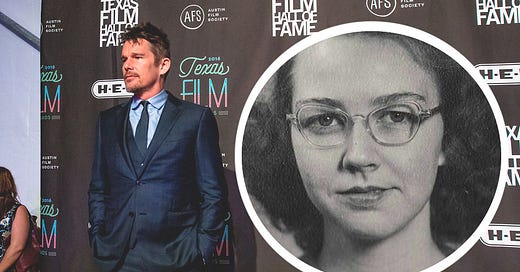Flannery Is Between a Hawke and Hard Place!
Ethan is directing Maya in a Flannery O'Connor biopic. Will they address her racism?
Maya Hawke IS Flannery O’Connor in Wildcat, Ethan Hawke’s upcoming attempt to catapult his little girl to Oscar glory. This is the sort of movie news that seems designed to appeal to a certain segment of people, over a thousand of whom subscribe to this very Substack! I myself am of several minds about it, and I’m going to dig into why here.
The Good:
First of all, let’s talk about the good. I like Ethan Hawke a lot. First Reformed is a pretty big part of my personality, and there’s no small amount of O’Connor energy emanating from that movie. I haven’t seen enough of his daughter’s acting to make a determination one way or the other there, but I’m of the opinion that most people have the ability to at least be a not-distactingly-bad actor as long as a capable director is on hand.
And then there’s Flannery O’Connor. She is, of course, a very good writer and, for Christians, a pretty important one. Insofar as a writer can change someone’s life, she’s changed mine. If you were raised on anemic Christian fiction and LaHaye-approved end times drivel, then reading your first O’Connor story is like spontaneously combusting. She took God seriously but never sentimentally. For her, Christianity was no guarantee of a happy ending. Quite the opposite, usually, as her characters tend to end up gored by bulls, strung up from the rafters, drowned in rivers or murdered along with their whole family. But O’Connor’s fans know that just because these endings are gruesome and macabre doesn’t necessarily mean there was no redemption. In her Southern Gothic literary universe, grace and violence swirl together, and it’s harder than you’d think to tell which is which.
And that’s true of our world too. We don’t always know what’s good or what’s bad. And just like O’Connor’s Misfit in A Good Man Is Hard to Find, we often find ourselves face-to-face with bad people who would have been good if there was someone there to kill them every day of their life. Sometimes, that person is in the mirror. Sometimes, they’re one of our favorite fiction writers.
The Bad
That’s relevant here because while O’Connor’s fiction lends itself to a fairly progressive read of her social views, her recently released letters undermine that view. While her remarkable short story Revelation may have featured a vision in which Black people are the first ones into Heaven alongside “battalions of freaks and lunatics shouting and clapping and leaping like frogs,” the woman herself was content with segregation.
And look. I’m not trying to “cancel” Flannery O’Connor here. Her work is important to me! And it’s exactly because it’s important to me that I think this needs to be addressed. I have enough respect for her to take her seriously, and I wish that didn’t include this part of her, but it does. So, let’s address it.
Shortly before her death of lupus in 1964, O’Connor wrote to a friend that she was “an integrationist by principle & a segregationist by taste anyway. I don’t like negroes. They all give me a pain and the more of them I see, the less and less I like them. Particularly the new kind.”
Keep reading with a 7-day free trial
Subscribe to clusterhuck to keep reading this post and get 7 days of free access to the full post archives.





